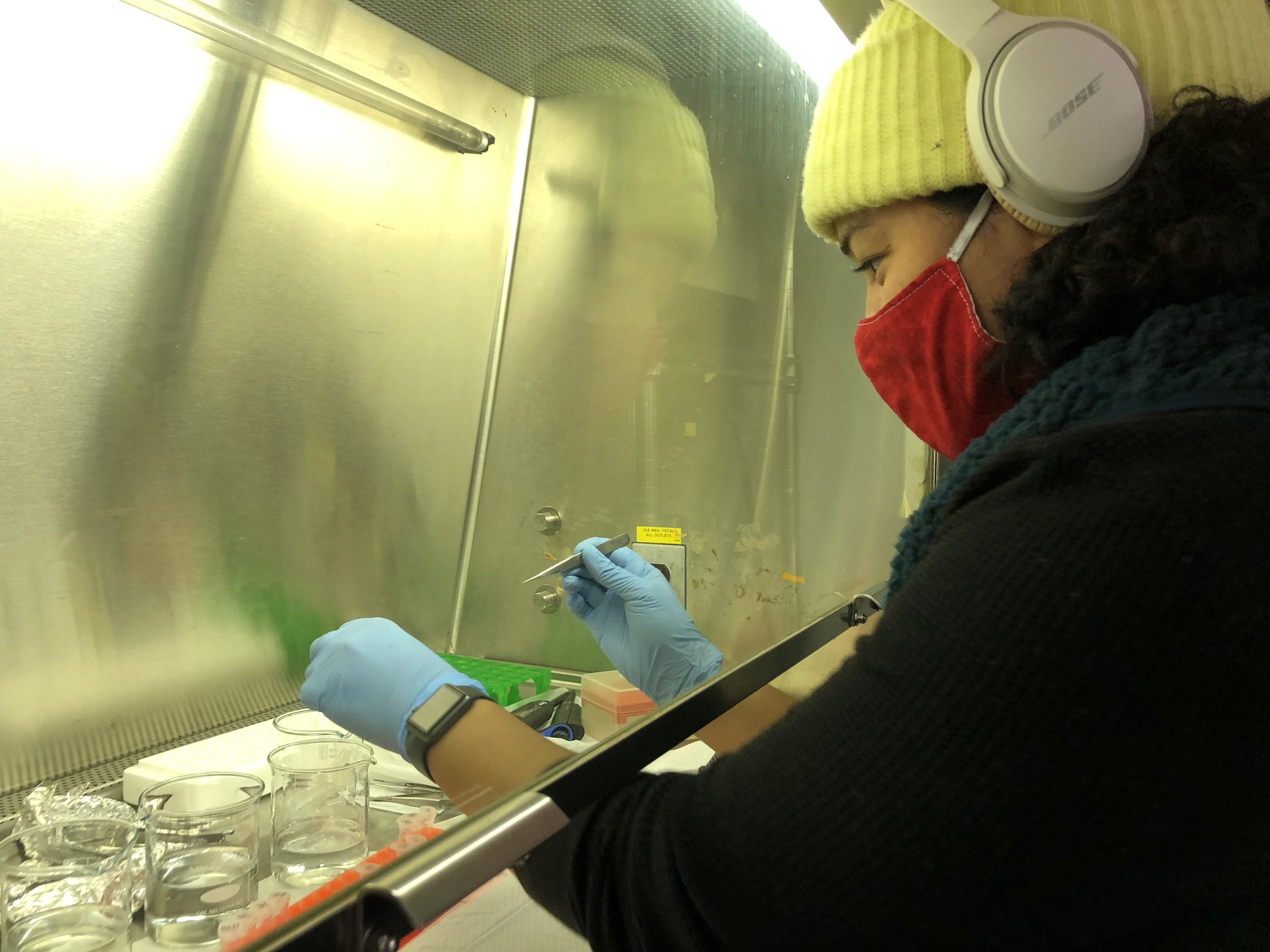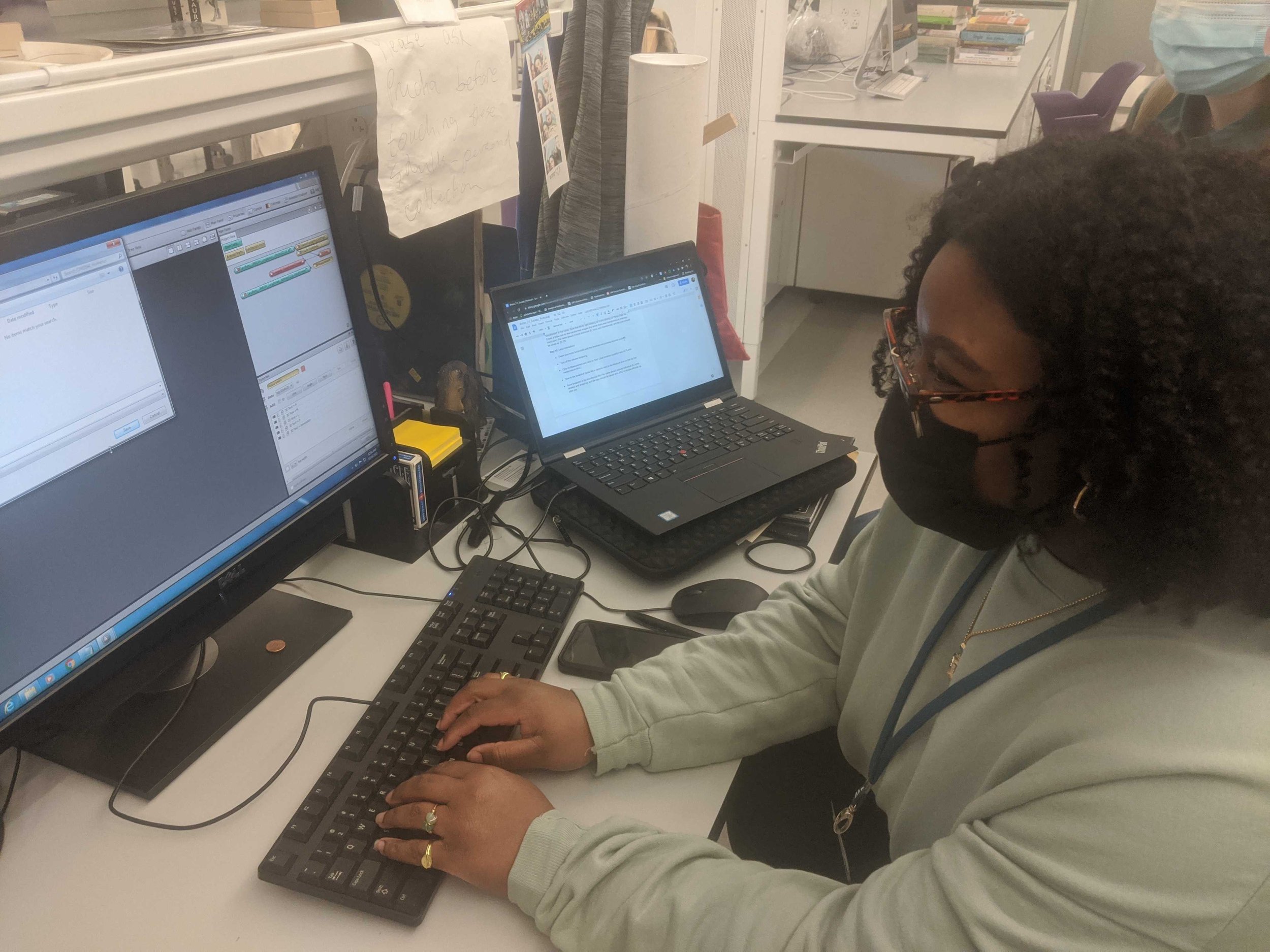Our Mission
Amber Trujillo conducting lab work at New York University
A 2014 survey conducted with members of the American Association for Physical Anthropologists (AAPA) found that Black members comprised just 0.9% of respondents (Antón et al. 2017). The authors attributed these disparities to factors such as STEM recruitment and retainment issues, lack of adequate mentorship, and the low accessibility of biological anthropology to minority-serving institutions. We agree that these are just some of the many obstacles that Black scholars face as they pursue degrees and careers in biological anthropology, and we aim to alleviate these barriers by using multiple approaches.
In response to the dearth of Black biological anthropologists, the mission of the Black in Biological Anthropology Collective group is to create transgenerational memory, connectedness, and knowledge of Black-identifying people that have and are working in Biological anthropology; offer mutual support, advocacy, and mentorship to current and aspiring Black biological anthropologists; and to create successful outreach programs that prioritize the recruitment, retainment, and persistence of Black scholars.
BiBA is inclusive of all Black-identifying biological anthropologists across Africa, the African diaspora, Australia, and the Pacific. This group welcomes all methodological approaches and theoretical orientations in the biological anthropology discipline, as well as methodologies based in fields that are allied to biological anthropology. Further, BiBA welcomes scholars at all stages of their academic career, including those who work within academia as well as those who do not. Most importantly, BiBA welcomes, celebrates, and supports Black biological anthropologists of every age, gender, sexual orientation, socioeconomic status, ability status, faith, and citizenship status.

Our History
BiBA: Black in Biological Anthropology Collective is the namesake of the website and social media group created by the Black students at NYCEP (New York Consortium in Evolutionary Primatology). NYCEP's efforts were and continue to be a response to the recurring underrepresentation and historical exclusion of Black scholars in the field of biological anthropology. This group merged with the attendees of the Black in Biological Anthropology Collective Letter Meeting held on June 17, 2020 who were working on a parallel initiative devoted to increasing the representation and scholarship of Black anthropologists and the Black in Biological Anthropology Collective group was formed in August 2020.
Tiara Jenkins working on a bone histology project at the George Washington University.
Our Values
The Black in BioAnth Collective values the many career stages and experiences that our membership comprises, and we aim to both center the diversity of those voices and make space for collective decision-making processes. This egalitarian approach is reflected in our leadership structure, which consists of an organizing committee with co-coordinators that remain in ongoing communication with task-based committees, roles that are all hierarchically equivalent.
The Black in BioAnth Collective values the recruitment and membership of biological anthropologists who identify with a lived Black experience. The collective is inclusive of all Black biological anthropologists across Africa and the African diaspora, as well as of Black scholars and professionals in allied fields. Most importantly, we celebrate and support Black biological anthropologists of every age, gender, sexual orientation, socioeconomic status, ability status, faith, and citizenship status. The BiBA Collective recognizes the ways that sexism, colorism, and xenophobia may impact/harm some members of our organization disproportionately. To that end, we value flexibility and transparency to enable ongoing, beneficial support for members of our organization.
Our Team
The Black in BioAnth Collective is an ever-growing international community of biological anthropologists, professionals, enthusiasts, and affiliated researchers. Our members are diverse in their cultural backgrounds, career trajectories, and interests. From undergraduate students with an interest in the field, to tenured faculty, to professionals in a variety of fields, the Black in BioAnth Collective strives to provide resources, opportunities, and a sense of community for all Black-identifying people interested in biological anthropology!
Tewabe Negash Kassaw and team conducting biological anthropology field research.



